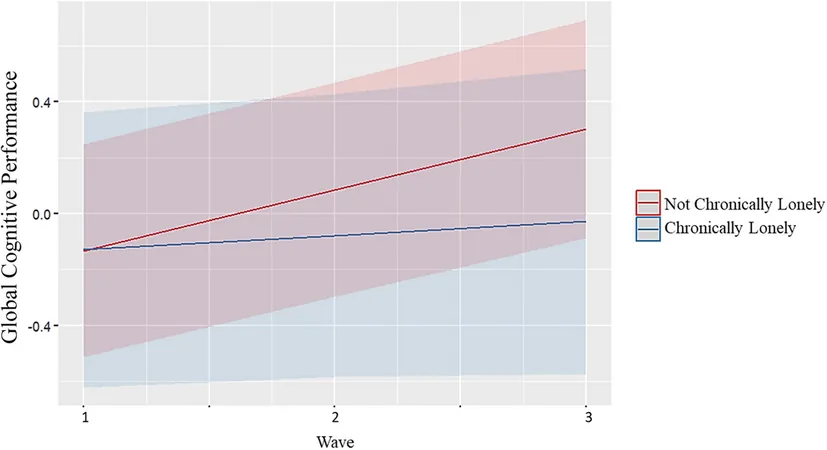
The Hidden Dangers of Chronic Loneliness: How It Affects Your Brain Health!
2025-03-29
Author: Nur
Introduction
Chronic loneliness is more than just a feeling; it can be a silent killer of our cognitive health. Defined as the distressing perception of a gap between the desired and actual social relationships, loneliness is emerging as a concerning global epidemic. Recent meta-analyses that examined 57 studies across 113 countries have demonstrated that loneliness is prevalent throughout various stages of adulthood. The implications are severe—loneliness has been linked to negative effects on mental and physical health, including increased risks of cardiovascular diseases, poor overall health outcomes, and even a higher risk of mortality.
Impact on Cognitive Decline
Moreover, the effects of loneliness extend to cognitive decline, making it a significant risk factor for Alzheimer’s disease and related dementias. With the aging population on the rise, this poses a profound socioeconomic challenge. Research has consistently shown that prolonged loneliness correlates with a decline in cognitive functioning among older adults. However, new insights suggest that chronic loneliness might also profoundly affects young and middle-aged adults—a demographic often overlooked in studies about mental health.
Origins of Chronic Loneliness
Chronic loneliness often stems from an inability to form satisfying social connections or being trapped in an environment that restricts social interactions. This type of loneliness can evolve from situational feelings, triggered by events like divorce or job loss, to long-standing isolation that can undermine an individual’s cognitive resources. Interestingly, the evolutionary perspective views loneliness as a natural human experience, a sign that prompts individuals to reconnect socially. However, when this loneliness transforms into a chronic state, it becomes harmful to both psychological and physiological well-being.
Mechanisms Affecting Cognitive Health
The mechanisms through which chronic loneliness affects cognitive health are multifaceted. Research indicates neurocognitive health may suffer due to persistent feelings of isolation leading to an overstimulated stress response, thus diminishing cognitive resources. Loneliness can inhibit cognitive reserve—the mental resilience built up through education and social interactions—resulting in a diminished ability to cope with stress and cognitive decline.
Recent Research Findings
Recent studies have highlighted the urgent need to address chronic loneliness, yet very few have focused on young and middle-aged adults to evaluate its long-term implications. Using a unique approach, recent research sought to analyze the relationship between chronic loneliness and cognitive performance over time among younger adults. This study utilized an innovative method involving ecological momentary assessment (EMA) to gather more precise data on cognitive functioning regularly over a two-year period.
Alarming Findings
The findings were alarming: individuals who reported chronic loneliness showed stagnant cognitive performance compared to their more socially engaged counterparts who experienced cognitive gains. Surprisingly, even in a cohort defined by youth and relative health, the detrimental effects of loneliness were evident, indicating that the cognitive decline associated with chronic loneliness can occur sooner than previously recognized.
Practice Effects and Limitations
While this study marks a significant step in understanding these dynamics, it also sheds light on practice effects—the improvements in cognitive performance achieved through repeated testing. Individuals experiencing chronic loneliness exhibited diminished practice effects, raising concerns that they may display symptoms akin to those with early-stage Alzheimer’s, despite being in a generally healthy population.
Future Research Directions
However, this study isn't without its limitations. The sample size was relatively small, and factors such as prior experiences of loneliness and the impact of external events like the COVID-19 pandemic were not accounted for. Future research must continue to explore these dynamics, particularly in understanding how modern challenges and social media influence loneliness and cognitive health.
Conclusion
In conclusion, chronic loneliness poses a serious threat beyond the individual’s well-being—it's a burgeoning public health concern that requires immediate attention. With adequate support systems and intervention strategies, society can potentially alleviate this silent epidemic and protect cognitive function over a lifetime. Don’t let loneliness take your brain health hostage—reach out, connect, and take charge of your cognitive future today!




 Brasil (PT)
Brasil (PT)
 Canada (EN)
Canada (EN)
 Chile (ES)
Chile (ES)
 Česko (CS)
Česko (CS)
 대한민국 (KO)
대한민국 (KO)
 España (ES)
España (ES)
 France (FR)
France (FR)
 Hong Kong (EN)
Hong Kong (EN)
 Italia (IT)
Italia (IT)
 日本 (JA)
日本 (JA)
 Magyarország (HU)
Magyarország (HU)
 Norge (NO)
Norge (NO)
 Polska (PL)
Polska (PL)
 Schweiz (DE)
Schweiz (DE)
 Singapore (EN)
Singapore (EN)
 Sverige (SV)
Sverige (SV)
 Suomi (FI)
Suomi (FI)
 Türkiye (TR)
Türkiye (TR)
 الإمارات العربية المتحدة (AR)
الإمارات العربية المتحدة (AR)